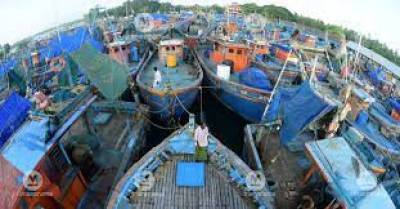Ban fostering species recruitment and hence advantageous to Karikadi fishery along Kerala coast
KOCHI, 11 February 2024: A new study by the ICAR-Central Marine Fisheries Research Institute (CMFRI) has found that the monsoon trawl ban is not detrimental to kiddi (karikadi) prawn resources.
The study, instead, has reaffirmed the efficacy of trawl ban by demonstrating its role in ensuring the long-term viability of the karikadi fishery along the Kerala coast particularly by fostering species recruitment during the monsoon season.
Kiddi prawn (Parapenaeopsis stylifera) is a substantial fishery along India’s southwest coast due to its high demand in domestic and international markets. Fluctuations in the karikadi catch following the implementation of mechanised fishing ban during the monsoon season had led fishermen to believe that unharvested prawns would be lost forever as these resources moved away from the nearshore to deeper waters.
However, CMFRI’s study found that even as these species do migrate to deeper areas, they remain accessible to current fishing methods from areas at a depth of 50 to 100 meter immediately after the trawl ban period. “Monsoon rainfall drives karikadi prawns to deeper waters due to their preference for high salinity and low temperatures”, the study said.
Moreover, the karikadi population in near-shore waters during the monsoon season is exclusively made up of juveniles, according to this study. Restricting fishing during this period facilitates continued recruitment of prawns, enabling the resources to grow in size and numbers. As a result, the southwest monsoon trawl ban is advantageous to this species, the study observed.
“Trawling activity can be focused towards 50 – 100 m depth between August – September (immediately following the ban period) to collect the resource that migrates to deeper waters during the monsoon”, the study suggested.
Further, it also found that one part of unharvested large-sized karikadi prawns are getting resettled along the Indian coast, once the salinity is at their preferable range in the coastal waters. The study was published in the latest issue of Regional Studies in Marine Science.
Addressing fishermen concern
“This study was carried out to address the socio economic issues raised by the trawl fishermen of Kerala during a stakeholder meeting held at CMFRI”, said Dr A P Dineshbabu, Head of the Shellfish Fisheries Division of CMFRI and the lead author of the study.
The study provided scientific evidence for how this species is distributed uniquely, using GIS-based spatial distribution tracking to explore how the movement and maturity of kiddi prawns correlate with environmental factors, he added.
Image credit: onmanorama.com























